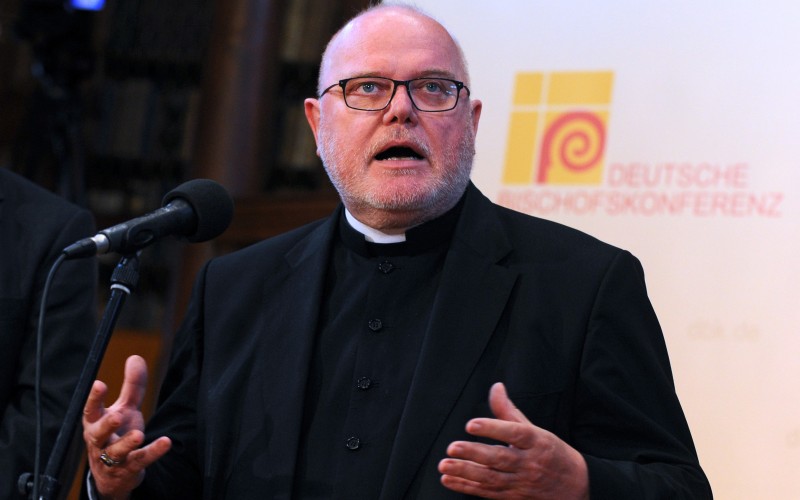The German bishops have declared independence from Rome?

The German bishops have declared independence from Rome on same-sex marriage: how far will the rot  spread now? (William Oddie in Catholic Herald – posted
spread now? (William Oddie in Catholic Herald – posted
Are we witnessing the beginnings of an international campaign of defiance against the Catholic moral law?
I begin with two apparently different questions, which are, however, closely related.
Have the German bishops moved decisively towards an Anglican-style (or maybe perhaps a Gallican-style) secession from the doctrinal authority of Rome?
Are we witnessing an international liberal-Catholic campaign towards the Church’s acceptance of same-sex marriage?
Germany first.
On July 30, the website of the German Bishops’ Conference reported that a woman who heads a Caritas Day Care Centre in Bavaria, had been asked in April to leave her position due to her announcement that she was going to “marry” a woman. The decision has now been rescinded.
Cardinal Reinhard Marx, Archbishop of the Diocese of Munich, has agreed to implement immediately new regulations approved by the German Bishops’ Conference at the end of April 2015, drastically liberalising the Catholic Church’s disciplinary rules in Germany. In the past, employees who deliberately and persistently did not live according to the Church’s moral teaching would (as at first happened in this case) have been asked to leave their position in institutions of the Church. Not all German bishops accept these new rules, though most do: three contiguous diocese have declared that they will not implement these decisions: those of Passau, Regensburg, and Eichstätt (still, it seems, Ratzinger territory).
Most German dioceses, however, are moving towards declaring independence from the Magisterium. The German bishops’ conference has also expressed support for Cardinal Kasper’s campaign to allow the administration of Holy Communion to civilly divorced and remarried Catholics.
Another German bishop, however—crucially, Cardinal Gerhard Mueller, prefect of the Congregation for the Doctrine of the Faith— has declared that doctrinal, or even disciplinary, decisions regarding marriage and family are not up for determination by national bishops’ conferences.
“It is an absolutely anti-Catholic idea that does not respect the Catholicity of the Church,” Cardinal Mueller said when asked, “Could certain doctrinal or disciplinary decisions on marriage and family be delegated to the episcopal conferences?”
“Episcopal conferences have authority on certain matters, but they are not a magisterium beside the Magisterium, without the Pope and without communion with all the bishops,” he continued.
The Cardinal Mueller had been asked for his views on those of another German Cardinal, about comments made by Cardinal Reinhard Marx, who is president of the German bishops’ conference. Cardinal Marx had told reporters that “We [the German Church] are not a branch of Rome. Each conference of bishops is responsible for pastoral care in its cultural context and must preach the Gospel in its own, original way. We cannot wait for a synod to tell us how we have to shape pastoral care for marriage and family here.”
We are not a branch of WHAT? We are not a BRANCH of ROME? But ALL Catholics are members of Churches which are branches of Rome just as the branch of a tree grows out of its trunk or it dies: that is why we are called ROMAN CATHOLICS. And all this talk of being responsible for care of its own part of the Church “in its pastoral context” is a weaselly way of saying that the German bishops have a right to determine what their own version of Catholic DOCTRINE is: when Marx says the German church “must preach the gospel in its own, original way” he is unambiguously declaring unilateral doctrinal independence from the teaching authority of the Church.
The Pope, even if he were minded to, doesn’t of course have the authority do what one is greatly tempted to say ought to be done: every dissenting bishop should be fired and replaced. That would lead, of course to an open schism in the German Church, and possibly the open secession of the rebellious part of it. Discuss: would that be not such a bad thing? I’m not sure.
But of course it doesn’t work like that. And it has to be admitted that there is a tide of lay opinion, even in parts of the Church where the bishops have remained firm, which is working against what they teach and do, actively campaigning against them. A recent American example illustrates this all too vividly. An article in the National Catholic Reporter, by one Jamie Manson argues as follows:
“It’s beginning to feel like every week brings a new story about the firing of an LGBT employee from a Catholic institution.
“The most recent well-publicised termination happened earlier this month at Waldron Mercy Academy in Philadelphia. The school declined to renew the contract of Margie Winters, the school’s director of religious studies, when it came to light that she is in a same-sex marriage. She says her administrators were well aware that she was “married” to a woman. It wasn’t until two parents complained to the Philadelphia archdiocese that she was terminated.
“In the wake of Winters’ firing, many commentators have suggested that bishops and Catholic institutions need to show greater mercy and compassion in dealing with its lesbian, gay, bisexual and transgender employees….
“As long as Roman Catholic doctrine teaches that same-sex relationships are sinful and a violation of God’s plan for humanity, LGBT employees will not be safe in their jobs in Catholic institutions.”
As Fr Zuhlsdorf rejoined, the article argues, quite simply that mercy and compassion means saying, publicly and with deliberation, that the Church’s teachings make no difference. And neither does public scandal. But, as he argues, mercy and compassion are always grounded in the truth: it is not compassionate to say that Catholics all have the right to determine according to their whim what moral behaviour consists of: the road to Hellfire is paved with “rights” like that.
The Church is, I very much fear, at a uniquely dangerous juncture. Things are not yet (whatever we may think of many of our own bishops) as bad in the English Church, though they are bad enough, God knows. But the idea HAS got about that everything, including the Church’s Millenial teachings on the moral law, is up for grabs.
That is why I dearly wish the October sessions of the Synod were not happening. No good can come of them: and potentially considerable harm could. I still hope, even maintain, that we will probably be OK, and that Cardinal Kasper will take a nosedive. But the possibility exists that he won’t. And then we are all in trouble. How long will it be, then, before the English Bishops’ conference goes the way of their German brethren?
















